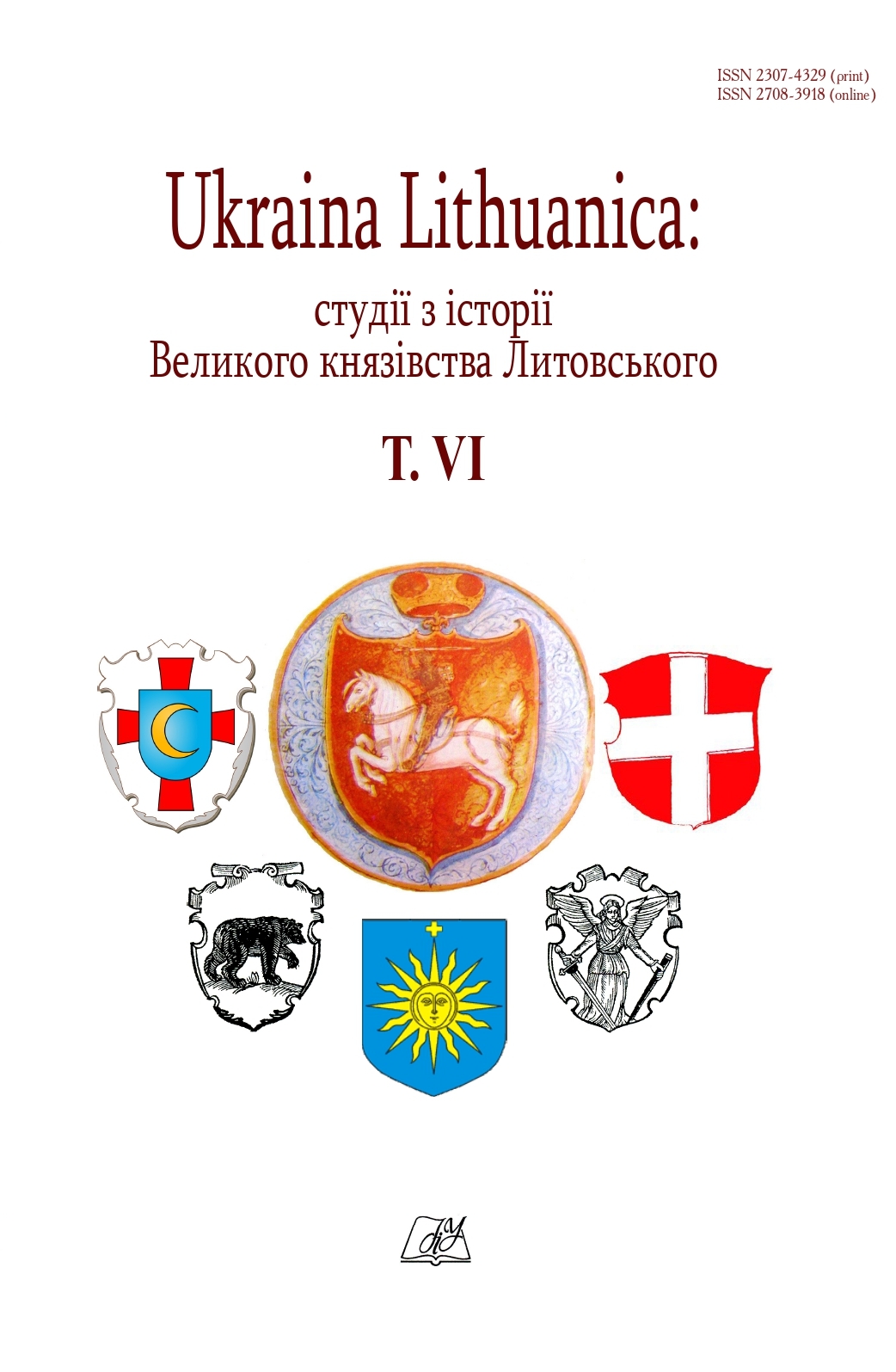
ACCEPTANCE OF SWEDISH PROTECTION
BY J. RADZIWILL IN 1655:
CONTEMPORARIES’ ASSESSMENTS
AND HETMAN’ MOTIVES
Oleksandr JUGA
Candidate of Historical Sciences (Ph.D. in History), Senior Lecturer,
Kamianets-Podilskyi National Ivan Ohiienko University
(Ukraine, Kamianets-Podilskyi), This email address is being protected from spambots. You need JavaScript enabled to view it.
ORCID: https://orcid.org/0000-0001-9872-8929
DOI: https://doi.org/10.15407/ul2021.06.072
Abstract
The article highlights the perception and assessments of contemporaries of the Grand Hetman of Lithuania Janusz Radziwill's acceptance of Swedish protection in 1655 and examines the reasons for such a step by the Hetman through the prism of his own vision and understanding of the then difficult situation of the principality and ways out.
It is determined that after the attack of Swedish troops on the Polish-Lithuanian Commonwealth in the summer of 1655, the situation of the Grand Duchy of Lithuania deteriorated sharply, as its territory became the epicenter of military confrontation (at the same time the war with the Moscow state). In such a situation, J. Radziwill and part of the political elite considered the adoption of Swedish protection to be an effective means of saving the principality. It is established that his step provoked the accusation of contemporaries of betraying the Commonwealth and King Jan Casimir.
It was found that the important reason for J. Radziwill's acceptance of Swedish protection was the lack of support from Warsaw in the face of a military threat to the principality from Sweden and Muscovy, and thus the impossibility of fighting them at the same time. The factor that prompted the hetman to take such a step was the capture of Vilna by Russian troops and the capitulation of the crown army near Uyscem in late July 1655. On the one hand, Lithuania's acceptance of the protection of the Swedish monarch threatened the integrity of the Commonwealth, which according to the results of the Union of Lublin in 1569 was proclaimed a state of two components – the Crown and Lithuania. However, on the other hand, given the fact that Lithuania was left alone with the military aggression of Muscovy and Sweden, it was an attempt to save the principality and strengthen its political influence.
Keywords
J. Radziwill, hetman, Grand Duchy of Lithuania, political elite, swedish protection, Sweden, Rzeczpospolita.
References
- Hazin, V. (2015). Mizh Moskvoiu ta Varshavoiu: Vintsent Korvin-Hosievskii yak obraz lytovskoi elity v umovakh rosiisko-polskoi viiny 1654–1667 rr. Ukraina Lithuanica: studii z istorii Velykoho kniazivstva lytovskoho, (III), 160–168. [in Ukrainian]. doi: https://doi.org/10.15407/ul2015.03.160.
- Hrushevskii, M. (1997). Istoriia Ukrainy-Rusy: v 11 t., 12 kn. Kyiv: Naukova dumka. Roky 1654–1657 (Vol. IX, ch. II). [in Ukrainian].
- Zaborovskij, L. V. (1994). Velikoe knyazhestvo Litovskoe i Rossiya vo vremya polskogo Potopa (1655–1656 gg.): Dokumenty, issledovaniya. Moskva: Nauka. [in Russian].
- Fedoruk, Ya. (2007). Velyke kniazivstvo Lytovske u yevropeiskii politytsi druhoi polovyny 50-kh rokiv XVII stolittia. Ukrainskyi arkheohrafichnyi shchorichnyk. (Vol. 12). Kyiv, 12, 739–757. [in Ukrainian].
- Czaplinski, W. (1957). Rola magnaterii i szlachty w pierwszych latach wojny szwedskiej. Polska w okresie drugiej wojny północnej 1655– 660. (Vol. 1). Warszawa, 137–196. [in Polish].
- Kossarzecki, K. (2007). Szlachta litewska wobec panowania szwedzkiego i moskiewskiego w okresi załamania Rzeczypospolitej przełomu 1655 i 1656 roku. Z dziejów stosunków Rzeczypospolitej Obojga Narodow ze Szwecją w XVII wieku. Warszawa: DiG, 277–301. [in Polish].
- Kotlubaj, E. (1859). Życie Janusza Radziwiłła. Wilno i Witebsk. [in Polish].
- Kubala, L. (1910). Wojna moskiewska r. 1654–1655. Szkice historyczne, (3). [in Polish].
- Majewski, W. (2007). Poddawanie się szwedom w Koronie w 1655 roku. Z dziejów stosunków Rzeczypospolitej Obojga Narodow ze Szwecją w XVII wieku. Warszawa: DiG, 105–119. [in Polish].
- Matwijów, M. (2001). Próby mediacjі hetmana litewskiego J. Radziwilla w konflikcie polsko-kozackim w latach 1653–1655. Wroclawskie studia wschodnie, 5, 10–32. [in Polish].
- Nagielski, M. (2007). Koncepcje prowadzenia działań przeciwko szwedom w dobie potopu w latach 1655–1660. Z dziejów stosunków Rzeczypospolitej Obojga Narodow ze Szwecją w XVII wieku. Warszawa: DiG, 165–181. [in Polish].
- Wasilewski, T. (1984). Ostatni Waza na polskim tronie. Katowice. [in Polish].
- Wasilewski, T. (1973). Zdrada Janusza Radziwiłła w 1655 r. i jej wyznaniowe motywy. Odrodzenie i Reformacja w Polsce, (18), 125–147. [in Polish].
- Wisner, H. (1970). Dysydenci litewscy wobec wybuchu wojny polsko-szwedzkiej (1655–1660). Odrodzenie i Reformacja w Polsce. (Vol. 15). Warszawa, 128–142. [in Polish].
- Wisner, H. (1981). Rok 1655 w Litwie: petraktacje ze Szwecją i kwestia wyznaniowa. Odrodzenie i Reformacja w Polsce. (Vol. 26), Warszawa, 83–103. [in Polish].
- Wójcik, Z. (1968). Rzeczpospolita na arenie międzynarodowej w XVII w. Pamiętnik X Powszechnego Zjazdu Historyków Polskich w Lublinie 9–13 września 1969 r. (Vol. 1). Warszawa. [in Polish].
